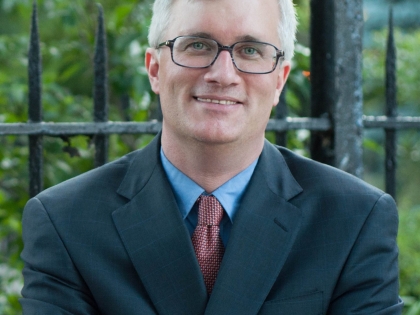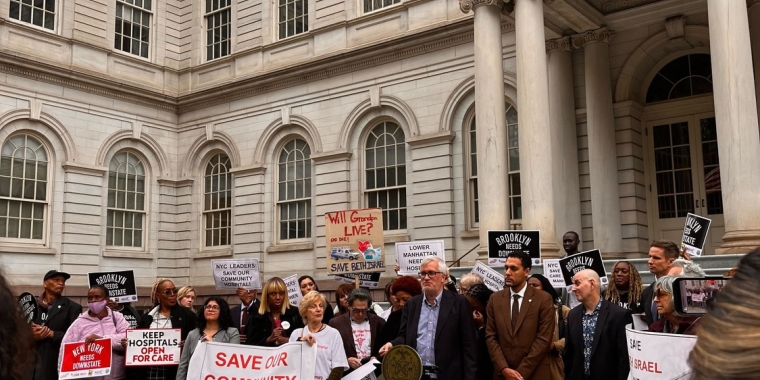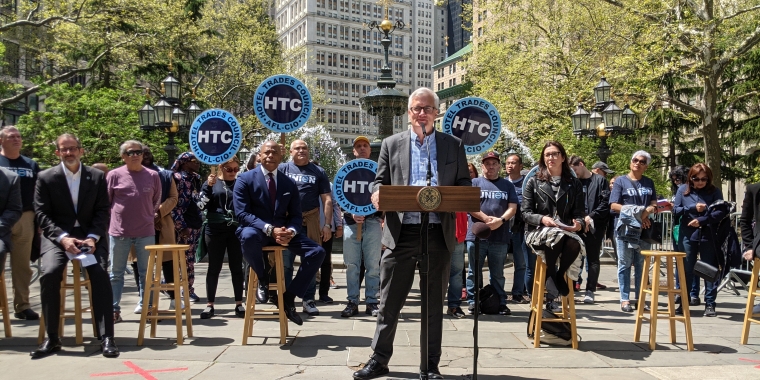
City Council Holds Oversight Hearing Examining Impact of Hospital Closures
October 30, 2024
-
ISSUE:
- Hospital Closures

MSBI Press Rally
New York, NY- Ahead of a New York City Council hearing that will examine the impacts of hospital closures on the communities they serve, the Chair of the Committee on Hospitals, Mercedes Narcisse, Chair of the Committee on Health, Lynn Schulman, and Council Members Carlina Rivera and Rita Joseph, elected colleagues, and advocates held a press conference on the steps of City Hall to demand deeper analysis of how proposed hospital closures would impact communities, better regional planning, and increased community engagement requirements. This action aims to highlight the urgent need to preserve a stable and equitable healthcare system for all New Yorkers, especially underserved communities who have traditionally borne the brunt of these closures. The rally illustrated deep concerns related to potential hospital closures, including the proposed shutdowns of Mount Sinai Beth Israel in Manhattan and SUNY Downstate in Brooklyn.
Mount Sinai Beth Israel is the only full service community hospital with an emergency room for a large swath of Lower Manhattan from Canal Street up to 23rd Street, from River to River. According to NYC Department of Health and Mental Hygiene Community Health Profile data from 2022 and the New York State Department of Health Hospital Profiles, residents of Lower Manhattan below 14th Street only have 0.81 hospital beds per 1,000 people, a very low rate. The sudden announcement last fall of the full-out closure of Beth Israel does not include a plan to construct another emergency department in the Lower Manhattan area, or to replace or maintain any of the health services currently or recently provided at Beth Israel, including pediatric care.
For the past two decades, communities have grappled with the loss of Cabrini Medical Center in Gramercy Park, St. Vincent's Hospital in Greenwich Village, and Kingsbrook Jewish Medical Center in East Flatbush. These closures have already strained access to essential healthcare services, leaving residents in surrounding neighborhoods, particularly those in NYCHA public housing developments and low-income areas, with fewer options.
Earlier this year, SUNY Downstate faced the threat of closure, and while it is now temporarily stabilized, the community awaits a plan from a state-appointed advisory board that will ultimately determine the hospital's future.
“The reports of pending closures, such as that of SUNY Downstate in Brooklyn and now Mount Sinai Beth Israel in Manhattan, have brought us to a critical juncture and would leave potentially devastating gaps in our healthcare infrastructure,” she said. “As a former nurse, I am deeply alarmed by this trend. Instead of working to make healthcare more accessible, decisions are being made that compromise access to healthcare for many New Yorkers for the sake of short-term financial gains. We must stand united to advocate for the sustainability of essential healthcare providers such as Beth Israel. Our community's health should never be sacrificed for financial expediency,” said Council Member Mercedes Narcisse, Chair of the Council’s Committee on Hospitals.
“No matter what zip code you live in, you should be able to have access to quality, affordable health care,” said Council Member Lynn Schulman, Chair of the Committee on Health. “Safeguarding and expanding hospital capacity for all New Yorkers has been a focus of mine since I worked in the leadership of Health and Hospitals in a previous life, where I was privy to the attempts at that time by New York State to decrease hospital services in the name of ‘saving monetary resources’. The proposed closures of Mount Sinai Beth Israel and SUNY Downstate is a further attempt to strip critical healthcare resources from neighborhoods that rely on them most, leaving a devastating gap that cannot simply be filled elsewhere. New York City needs a robust, inclusive approach to healthcare planning that prioritizes equitable access and reinforces our hospitals’ ability to serve our growing population. Today, we are here to send a clear message: healthcare is not optional, and every New Yorker deserves access to the medical care they need close to home.”
“Our community has faced hospital closures and disinvestment in health services, and Manhattan residents below 14th Street only have less than one bed per 1,000 people. Mount Sinai Beth Israel is the only full-service hospital with an emergency department below 23rd street, and our community has been fighting in coalition to prevent its closure and protect access to essential healthcare services. Hospital closures harm our most vulnerable communities and reduce our readiness for emergency events. We must enhance community engagement requirements for proposed closures, improve regional planning efforts, and take every step necessary to safeguard healthcare access for all,” said Council Member Carlina Rivera (D-02).
“The 40th Council District is home to SUNY Downstate and I believe that protecting hospitals like SUNY Downstate is vital to ensuring quality, accessible healthcare for our communities. As a key healthcare provider and teaching institution in Brooklyn, SUNY Downstate plays a critical role in offering comprehensive medical services, supporting research, and training future healthcare professionals who often go on to serve locally. Preserving such institutions is not only about healthcare access but also about upholding jobs, community well-being, and educational opportunities. Investment in facilities like SUNY Downstate reinforces our commitment to public health, enabling us to respond effectively to crises and ongoing health needs, especially in underserved communities where healthcare disparities persist. Safeguarding these hospitals is a priority that directly impacts our quality of life and strengthens our healthcare infrastructure,” said Council Member Rita Joseph (D-40).
“We often hear that the city is “over-bedded” or that certain services aren’t needed, but we know that in reality healthcare is far more nuanced and local than that. It’s imperative that we take a deep, hard look at our healthcare system, and closely analyze the impact that any closure or relocation may have on local neighborhoods and other healthcare systems, particularly the public hospital system,” said Manhattan Borough President Mark Levine. “Healthcare is rapidly changing – hospitals are on the one hand consolidating care, while also finding ways to treat as many patients as possible outside of traditional campuses. Each hospital system closely impacts the other, so it’s time to take a hard look, challenge assumptions, and fight for every community to have access to the care they need.”
“Local hospitals with excellent care and close community ties are fundamental to an equitable healthcare ecosystem,” said Brooklyn Borough President Antonio Reynoso. “Any decision to close the doors of a healthcare institution must be held to the highest standard of scrutiny to ensure continuity of care and to protect our most vulnerable neighbors from harm. I’m proud to stand with Council Member Narcisse, Council Member Schulman, Council Member Rivera, and Council Member Joseph as they investigate the full impact of hospital closures and advocate for a healthcare system that works for New Yorkers across all five boroughs. Every New Yorker deserves access to healthcare in their own neighborhood.”"The hospital closure crisis has had a devastating impact in Queens, which has seen numerous hospitals close over the last two decades," said Queens Borough President Donovan Richards Jr. "Our remaining hospitals felt the impact of it during the height of the COVID-19 pandemic, while our historically marginalized communities without hospitals continue to experience negative health outcomes at much higher rates. For the sake of our borough's overall health and to reverse generational healthcare injustices, we need more hospitals, not fewer."
“All New Yorkers need and deserve full access to high-quality health care,” said State Senator Brian Kavanagh, who represents Lower Manhattan. “For the past seven years, since my very first year in the Senate, I have sponsored legislation that would strengthen the State Health Department’s process for reviewing proposals to close hospitals or reduce services, and for engaging and giving voice to communities that will be affected by these actions before they are approved. Absent strong formal requirements for that kind of oversight, I have been proud to work with my colleagues in government and our community to advocate for the strongest possible response to the proposed closure of Mount Sinai Beth Israel, and I am grateful to Councilmembers Narcisse and Schulman, and particularly to Councilmember Rivera for her partnership and her unwavering commitment, and for holding this hearing today. I also thank my colleagues, Senate Health Chair Gustavo Rivera, Senator Kristen Gonzalez, and Assemblymember Simon, with whom I worked closely to pass S8843A, which would require much greater oversight, engagement, and public information before any action is taken to close a hospital or reduce services. I thank the Council for taking up a resolution in support of this State legislation and I urge the Governor to sign it into law.”
"I am encouraged to see that the City Council is examining the impacts of hospital closures on meeting the health care needs of city residents, and exploring regional healthcare planning for hospital service needs. There is a real imbalance in the availability of hospital, outpatient, and primary care services throughout New York City, and the pandemic revealed vulnerabilities in our healthcare infrastructure; there is clearly a need to conduct a regional healthcare needs assessment and planning process. Toward this end, I call on Governor Hochul to enact the Local Input in Community Healthcare Act, sponsored by Senator Rivera and Assemblywoman Simon," said State Senator Liz Krueger (D-28).
“The Mount Sinai Beth Israel Hospital closure process has made it abundantly clear that we need to establish safeguards to ensure that when hospitals are forced to close New Yorkers are not stuck without access to healthcare. For years, those living in lower Manhattan have relied on Mount Sinai Beth Israel as their only full service community hospital with an emergency room. The announcement of a pending closure of this hospital, as well as the termination of services that has since taken place, understandably left many residents fearful, uncertain as to where they will be able to access the health care services they require going forward. I join my elected colleagues in the call to consider what can be done at the city and state levels to guarantee that when hospitals are forced to shut their doors there are first plans in place to ensure that all those who previously relied on those facilities will continue to receive the high quality healthcare they need,” said State Senator Brad Hoylman-Sigal (D-47).
"Thank you to the City Council for shining a light on the devastating impacts of the proposed closures of Mount Sinai Beth Israel and SUNY Downstate. Our healthcare system is in crisis. Over the past decade, several hospitals have closed across our city, while critical services have migrated towards wealthier neighborhoods, and working-class New Yorkers have been stranded in healthcare deserts. Now, more than ever, we must protect our community hospitals and prioritize healthcare access for the most vulnerable New Yorkers. Regional healthcare planning, fully funding our public hospitals, and increasing community engagement are essential to building a healthcare system that works for everyone,” said State Senator Kristen Gonzalez (D-59).
"By structuring the closure process to allow input from community stakeholders only after a closure has been approved, we place an additional burden on New Yorkers who already face significant health disparities within a broken healthcare system. My bill, the Local Input in Community Healthcare Act, addresses the timeframes of the closure review process to provide the community and local officials with adequate time to weigh in on the proposed closure and to take action to ensure that those who rely on the hospital can continue to access the services they need. I urge Governor Hochul to sign the Local Input in Community Healthcare Act,” said State Senator Gustavo Rivera, Chair of the Committee on Health.
“I strongly oppose Mount Sinai Beth Israel’s plan for closure, as it will disproportionately affect low-income patients from medically underserved communities, strain other hospitals, and limit access to essential medical services. Today's rally and hearing brings to the forefront the critical issue of hospital closures and how they devastate communities. Closures like the one proposed by MSBI leave critical service gaps, threaten vulnerable communities, and too often occur without community engagement. This can’t continue,” said Assembly Member Harvey Epstein (D-74).
“Even as the nature of healthcare delivery changes, there continues to be a need for a full service community hospital in Lower Manhattan. When people in a health crisis arrive at an emergency room, some portion of them will need to be admitted to the hospital. Relegating healthcare for underserved communities to urgent care is not an acceptable answer. Mount Sinai came to this community assuring residents they were committed to serving its needs and instead immediately began to dismantle the profitable services only to relocate them in other branches of its system far away from the community. Everyone knows that the quality of care and improved health outcomes are linked to having friends and family available to visit and advocate for patients. Moving patients far away from their homes diminishes the ability of friends and family members to be present and undermines the recovery of patients. I was proud to co-sponsor the Local Input in Community Healthcare (LICH) Act which would require more robust public engagement when a hospital seeks to close. Healthcare systems should not be permitted to erode access to essential healthcare services, and I thank the Council for convening this Hearing to evaluate the devastating impact hospital closures can have on our most vulnerable communities,” said Assemblymember Deborah J. Glick (D-66).
"When SUNY Downstate closed Long Island College Hospital (LICH) in 2013, the Health Department refused to consider the impact on the health and wellness of the community that LICH had served for 156 years. The community repeatedly raised these concerns, but under current state law, the Health Department was only required to have a public meeting 30 days after the hospital was closed. That is too little too late. Thank you to the City Council for hosting this hearing and to Councilmember Rivera for her resolution supporting my LICH bill,” said Assemblymember Jo Anne Simon (D-52).
"The closure of Mount Sinai Beth Israel would be a devastating blow to the residents of the Lower East Side and Chinatown, who already face significant healthcare inequities”, said Council Member Christopher Marte (D-01). “With less than one hospital bed per 1,000 people in Lower Manhattan, this decision will disproportionately harm our most vulnerable neighbors, including low-income families and seniors. We cannot allow financial decisions to dictate the health and well-being of our communities. I will continue to stand with residents and advocates to fight for accessible, equitable healthcare in Lower Manhattan."
“The potential closure of Mount Sinai Beth Israel Hospital leaves a major gap in medical care in Lower Manhattan,” said Council Member Erik Bottcher (D-03). “All New Yorkers deserve unburdened access to hospital care, regardless of socio-economic status. Public health authorities must find solutions that prioritize community needs and healthcare access. I want to thank Council Member Carlina Rivera and all my colleagues in government for fighting for healthcare services for our communities.”
"The potential closure of Mount Sinai Beth Israel is an alarming event that will impact our communities deeply," said Council Member Keith Powers (D-04). "After the challenges of the pandemic, I am more determined than ever that our healthcare infrastructure must be shored up so that it can care for New Yorkers in times of emergency. We need more hospitals, not less. We cannot allow profits to be the priority when the health of our communities is at risk."
“As we face the potential closures of Mount Sinai Beth Israel and SUNY Downstate, we must recognize the grave implications this will have on our communities’ health and well-being,” said New York City Council Majority Whip Selvena N. Brooks-Powers. “Hospital closures are not just about lost buildings; they mean diminished access to essential care, especially in underserved neighborhoods that have already faced decades of healthcare inequities. Every New Yorker deserves accessible, quality healthcare within their community. I stand with my colleagues and advocates in calling for greater transparency, community engagement, and thoughtful planning to ensure that healthcare infrastructure remains strong and equitable across our city.”
“We are heartened that our City Council is recognizing this serious problem of hospital closures across our city, and is stepping forward to protect access to hospital-based care in all our communities, not just the well-off and well-insured ones,” said Mark Hannay, Director of Metro New York Health Care for All. “Unfortunately, our state leaders have abdicated their responsibility to provide robust oversight of this situation, instead ceding the matter to industry forces. We have some ideas of how City leaders can step into the breach, and look forward to sharing them with the Council during today’s hearing.”
"Hospital closings are worsening already dangerous inequities in community access to hospital care across our city," said Lois Uttley, co-convener of Community Voices for Health System Accountability. "Lower Manhattan, where there is less than one hospital bed per 1,000 people, is in danger of losing Beth Israel Medical Center. Meanwhile, the Upper East Side, where there already are 10.5 hospital beds per 1,000 people, is slated for a $1.6 billion expansion of Lenox Hill Hospital. We need to stop the trend of health systems closing hospitals in medically underserved lower-income neighborhoods and expanding them in affluent places that don't need or want more hospital capacity."
“Every New Yorker deserves access to quality hospital care. The recent wave of community hospital acquisitions and closures by large hospital systems in NYC are profit-motivated business decisions that inadequately address community needs, and ultimately lead to worse health outcomes for vulnerable patients. The closure of Beth Israel would reinforce the “separate and unequal” healthcare that many residents of Lower Manhattan receive. There is an epidemic of community hospital closures happening across the United States. What happens next in the effort to Save Beth Israel will set an example to underserved communities across the country about what New York stands for,” said Dr. Kimberly Murdaugh, representative of the Save Beth Israel and New York Eye & Ear Campaign.
"People with disabilities require the unique blend of services that only a full service hospital can provide because of the complexity of our healthcare needs," said Mike Schweinsburg, President of the 504 Democratic Club. “The loss of comprehensive healthcare in many cases would force disabled people into nursing homes, which would rob them of their independence and shave years off their lifespan.”
“The Center for Independence of the Disabled, New York (CIDNY) advocates for the New York City Council to ensure that people with disabilities have dependable, lifesaving, medical institutions like Beth Israel and the New York Eye and Ear Infirmary to continue to address their disability-related issues. Over the last few years, there have been numerous hospital closures throughout the city that have greatly impacted people who are poor, people of color, and people with disabilities. Our lives matter. We need reliable medical services in the neighborhoods where we reside. Please help to save our lives today and immediately stop the greed and the unnecessary closures of these medical centers,” said Sharon McLennon Wier, Ph.D., MSEd., CRC, LMHC, Executive Director of CIDNY.
Share this Article or Press Release
Newsroom
Go to Newsroom
250 Water Street Working Group Meeting (4/5)
April 5, 2022

Down in the Depths on the 50th Floor
March 29, 2022
